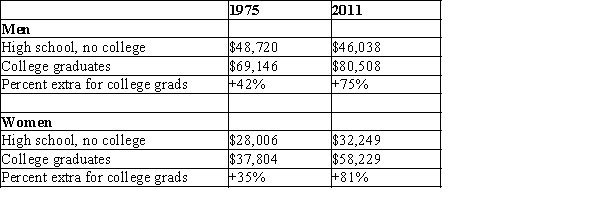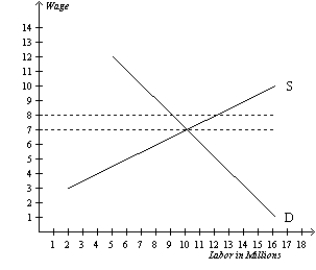A) has more education.
B) is willing to work the night shift.
C) is a man, whereas worker B is a woman.
D) has better performance reviews, indicating higher productivity.
F) B) and D)
Correct Answer

verified
Correct Answer
verified
Multiple Choice
A difference in wages that arises to offset the nonmonetary characteristics of different jobs is known as
A) a compensating differential.
B) an inefficiency wage.
C) the equilibrium difference.
D) a union wage.
F) A) and D)
Correct Answer

verified
Correct Answer
verified
True/False
One example of labor-market discrimination is that a firm may be less likely to interview a job candidate whose resume clearly indicates he is not a good fit for the job.
B) False
Correct Answer

verified
Correct Answer
verified
Multiple Choice
Empirical work that does not account for differences in the productivity of workers
A) is unlikely to find evidence of wage differentials.
B) can provide strong evidence of labor market discrimination.
C) is likely to misinterpret apparent evidence of labor market discrimination.
D) is accepted as superior to empirical work that does correct for differences in productivity of workers.
F) None of the above
Correct Answer

verified
Correct Answer
verified
Short Answer
If a good is produced with technology that allows the best producer to supply every customer at a low cost and every customer in the market wants to enjoy the good supplied by the best producer, the best producer will be called a
Correct Answer

verified
Correct Answer
verified
Short Answer
Unions are often able to sustain wages above the equilibrium wage because they can threaten to
Correct Answer

verified
Correct Answer
verified
Multiple Choice
A signaling theory of education suggests that educational attainment
A) is a signal of high marginal productivity.
B) is correlated with natural ability.
C) increases the productivity of low-ability workers.
D) Both a and b are correct.
F) All of the above
Correct Answer

verified
Correct Answer
verified
Multiple Choice
Jake and Harry each have 130 hours of college credit from Impressive University. Each has 30 hours of economics. Jake has a bachelor's degree, while Harry is 3 credits short of required physical education classes and therefore does not have a degree. Each of them has one year of experience as a market analyst for ABC Company. Assuming that the physical education class would not enhance Harry's job performance, if Jake earns a higher salary than Harry, the ABC Company may subscribe to the
A) human capital theory.
B) discrimination theory.
C) compensating differential theory.
D) signaling theory.
F) A) and C)
Correct Answer

verified
Correct Answer
verified
Multiple Choice
Which of the following statements does not accurately describe the market for labor?
A) The characteristics of workers, such as their education and experience, the characteristics of jobs, such as their pleasantness or unpleasantness, and the presence or absence of discrimination by employers all determine equilibrium wages.
B) Labor unions, minimum wage laws, and efficiency wages all may increase wages above their equilibrium level.
C) Firms are willing to pay more for better-educated workers as long as there is an excess supply of this type of worker.
D) Discrimination by employers against a group of workers may artificially lower wages for that group.
F) All of the above
Correct Answer

verified
Correct Answer
verified
Multiple Choice
Studies of professional sports teams suggest that, in sports, racial discrimination in previous decades was
A) rare.
B) common and that owners of teams are largely to blame.
C) common and that customers (fans) are largely to blame.
D) None of the above is correct; there are no reliable studies of discrimination in sports due to the difficulties inherent in measuring athletes' productivity.
F) A) and C)
Correct Answer

verified
Correct Answer
verified
Short Answer
Which theory states that education is correlated with natural ability?
Correct Answer

verified
Correct Answer
verified
Multiple Choice
Over the past several years, the earnings gap between high-skilled and low-skilled workers has (i) Narrowed because the demand for unskilled labor has risen over time relative to the demand for skilled labor. (ii) Widened because the demand for skilled labor has risen over time relative to the demand for unskilled labor. (iii) Narrowed because the supply of unskilled labor has risen over time relative to the supply of skilled labor. (iv) Widened because the supply of skilled labor has risen over time relative to the supply of unskilled labor.
A) (i) only
B) (ii) only
C) (i) and (iii) only
D) (ii) and (iv) only
F) A) and B)
Correct Answer

verified
Correct Answer
verified
Multiple Choice
The most popular movie stars have high incomes for a number of reasons. One such reason is
A) an ability for almost everyone to enjoy movies at a relatively low cost.
B) the above-average intellect of the average movie star.
C) a compensating differential.
D) a lack of technological advances in the movie industry.
F) All of the above
Correct Answer

verified
Correct Answer
verified
Multiple Choice
Christy and Claudia are aspiring models. Talent scouts consider them to be similarly beautiful. Both enter a talent show. Claudia contracts food poisoning the night before the competition and withdraws. Christy wins the competition and signs a multi-million dollar contract. The differences in their earnings likely reflect
A) discrimination.
B) differences in human capital.
C) differences in signaling.
D) chance.
F) A) and B)
Correct Answer

verified
Correct Answer
verified
Multiple Choice
Sometimes wages are set above the equilibrium level when
A) garbage collectors earn higher wages than secretaries due to compensating differentials.
B) accountants earn more than dental technicians due to higher educational requirements.
C) movie superstars earn more than talented plumbers.
D) unions negotiate higher wages by threatening to strike.
F) C) and D)
Correct Answer

verified
Correct Answer
verified
Multiple Choice
Factory workers who work the day shift earn less per hour than similarly-skilled factory workers who work the night shift. The difference in pay is attributed to
A) the marginal product of labor.
B) the marginal product of capital.
C) diminishing marginal returns.
D) a compensating differential.
F) A) and B)
Correct Answer

verified
Correct Answer
verified
Multiple Choice
That some schools direct females away from science and math courses is evidence of
A) labor-market discrimination
B) discrimination that occurs prior to people entering the labor market
C) discrimination by customers
D) discrimination by employers
F) A) and B)
Correct Answer

verified
Correct Answer
verified
Multiple Choice
Table 19-1  Source: US Census Bureau and Mankiw's calculations
-Refer to Table 19-1. From 1975 to 2011, the salary gap among women who graduate from college compared to those who complete only high school
Source: US Census Bureau and Mankiw's calculations
-Refer to Table 19-1. From 1975 to 2011, the salary gap among women who graduate from college compared to those who complete only high school
A) increased by 35% while the salary gap among men increased by 42%.
B) more than doubled while the salary gap among men rose significantly but less than doubled.
C) increased, but the salary gap among men decreased.
D) decreased, but the salary gap among men increased.
F) None of the above
Correct Answer

verified
Correct Answer
verified
Multiple Choice
The very high pay earned by the best actors and actresses is partially explained by the fact that
A) they benefit from a compensating differential.
B) moviegoers all want to see the very best actors, not second-rate actors.
C) they have acting degrees from accredited acting schools.
D) the supply of good actors is very large.
F) None of the above
Correct Answer

verified
Correct Answer
verified
Multiple Choice
Figure 19-1  -Refer to Figure 19-1. What is the change in employment of having the minimum wage at $8 instead of $7?
-Refer to Figure 19-1. What is the change in employment of having the minimum wage at $8 instead of $7?
A) 2 million jobs are gained
B) no jobs are gained or lost
C) 1 million jobs are lost
D) 3 million jobs are lost
F) A) and B)
Correct Answer

verified
Correct Answer
verified
Showing 461 - 480 of 511
Related Exams